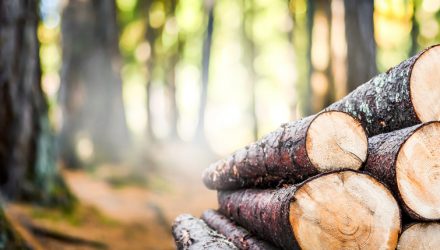The global lumber and timber industry probably doesn’t strike many investors as a prime destination for sustainable investing. A deeper examination reveals something different.
On that note, and with Earth Day right around the corner, the Invesco MSCI Global Timber ETF (CUT) is an interesting exchange traded fund to consider. CUT, which turns 16 years old in November, holds 82 stocks and tracks the MSCI ACWI IMI Timber Select Capped Index.
Upon further examination, CUT has merit as a climate change/sustainable investing idea because while the timber industry does in fact cut trees down, it also requires replenished supply, meaning the industry is an active grower of trees.
“Wood products are a backbone of our society. Ensuring that forestry land owners operate responsibly can help provide lumber for houses, pulp for paper, and fuel for cooking and heating, while also helping to preserve the environmental benefits of timberland,” noted Morningstar analyst Adam Fleck.
CUT is a materials-heavy ETF, allocating over 90% of its weight to that sector, but the secret to its sustainability credentials comes from a more than 9% allocation to timber real estate investment trusts (REITs). Weyerhaeuser (NYSE: WY) and Rayonier (NYSE: RYN), which combine for 7.38% of CUT’s roster, are two of the names mentioned by Fleck as timber stocks with sustainability credentials.
“For investors seeking to focus their portfolios to companies driving positive impact, Sustainalytics estimates that each of Rayonier’s and Weyerhaeuser’s forestry businesses are well aligned with the Impact Themes of Resource Security and Healthy Ecosystems. Weyerhaeuser is estimated to have 14.8% of its 2021 revenue tied to activities that are aligned with these themes, while Rayonier’s aligned revenue is estimated to be even higher, at 51.7%,” added the Morningstar analyst.
In 2021, both firms scored well in terms of generating the majority of their revenues in sustainable fashion. Adding to the allure of Weyerhaeuser and Rayonier as potential contributors to the CUT bull case are the facts that both firms are slated to grow earnings per share at decent rates over the next several years, and both are undervalued at current levels.
Additionally, timber stocks, including the pair of aforementioned CUT holdings, have inroads to carbon capture — a still-nascent segment with compelling long-term growth prospects.
“More upside may come from the capture and control of carbon dioxide emissions. Historically, the most profitable use of forestry acres has been the sale of timber, and leases of the land for recreational or industrial purposes. But a relatively new revenue stream has captured the attention of investors: permanent carbon sequestration,” concluded Fleck.
For more news, information, and analysis, visit the Innovative ETFs Channel.
The opinions and forecasts expressed herein are solely those of Tom Lydon, and may not actually come to pass. Information on this site should not be used or construed as an offer to sell, a solicitation of an offer to buy, or a recommendation for any product.








